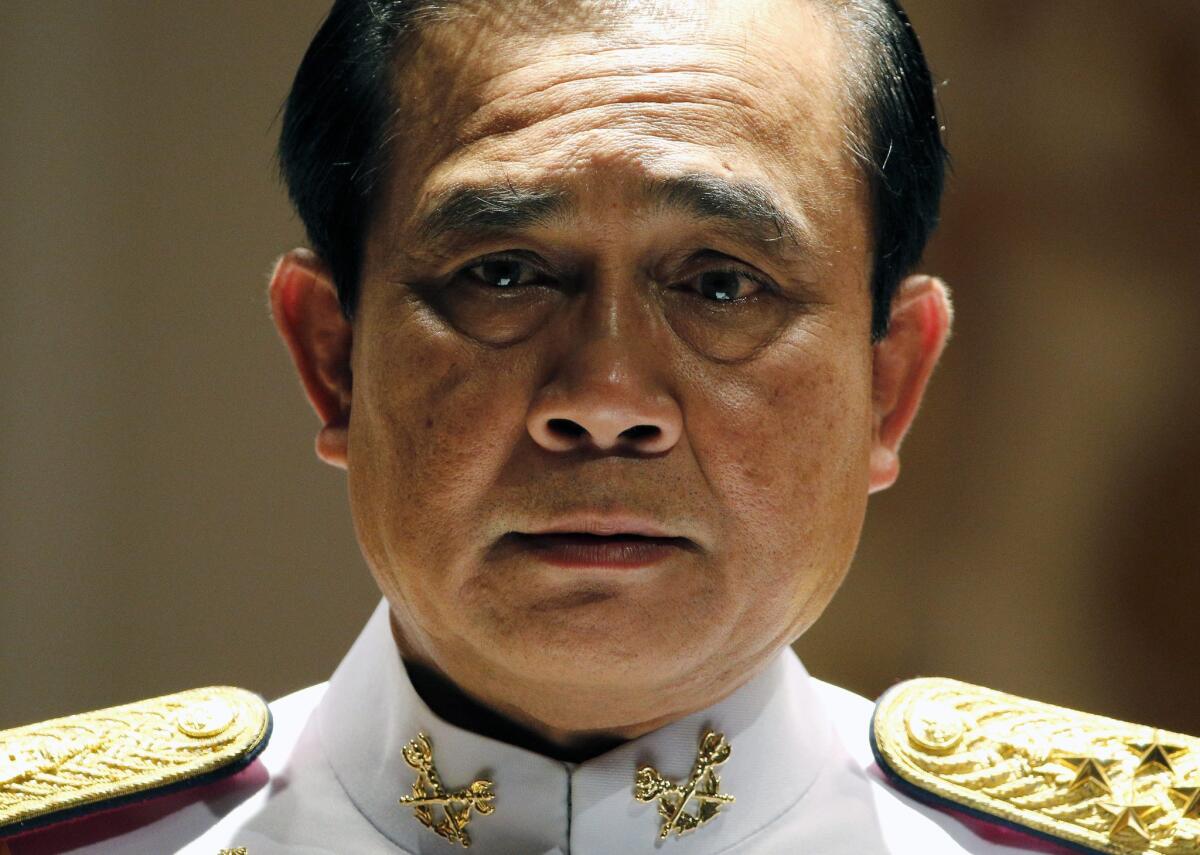Op-Ed: Thai coup holds promise of democracy

- Share via
In the millennium of Thai history, the distinction between civilian and military servant of the king has barely existed. Certainly for five centuries generals became ministers and ministers became generals. Since 1932, the Royal Thai Army has always had the last word on who governs. There have been short periods of democracy, when the interests of a broader electorate have coincided with corporate Army interests.
That’s one way to look at the coup d’etat that unfolded last week in Thailand. Army Gen. Prayuth Chan-ocha and the military forced out an acting prime minister who, in turn, had taken over after the Constitutional Court removed Prime Minister Yingluck Shinawatra from office this month in an abuse-of-power case. Yingluck, a caretaker premier, had governed by taking orders from her brother, despot and former Prime Minister Thaksin Shinawatra, who is in self-exile in Dubai.
The nation has been embroiled in months-long political protests between the “Yellow Shirts” — urban Thais who support the king and the established interests who wanted the sitting government out — and the “Red Shirts” — mostly poorer residents of the provinces who support Thaksin and seek his return to power.
So as an ambitious and capable general tries to stabilize the nation — and now with the king’s public stamp of approval — it’s entirely possible that he will prove that coups are not all bad.
The roots of the political turmoil are deep.
The catastrophic economic crisis of 1997-98 led to a broadly based Constitution in which a popular base (as opposed to a purely royal one) was recognized. Hard-working Thais repaired the economic damage rapidly. But never in such circumstances do the rewards get distributed evenly, and they certainly weren’t this time. The huge populations of the north and northeast were just waiting to be harnessed by any politician who would promise them their fair share of the national wealth.
It was Thailand’s bad luck, like Germany’s in the 1930s and Italy’s in the 1920s, to get a demagogue promising heaven and then some. Thaksin had made billions in the cellphone industry and had begun buying off journalists and northern politicians. He overwhelmingly won the 2001 election and then quickly showed his true colors. He put the lid on the parts of the media he didn’t already control, reportedly had 3,000 small-time drug dealers killed in his war on drugs and generally showed that he was there to stay.
Democratic theory has never meant simple rule by the majority. Thaksin certainly used checks and balances but of a different sort to strengthen his power base in the police and with evidently less success with the army. He opened the coffers for the north. The military had thrown Thaksin out in 2006 but was a little lazy in replacing him with anything viable. Eventually it caught him on a criminal act, and that’s when he went into exile.
And the Red Shirts and Yellow Shirts have been at it since. Through it all, however, the Thai economy has mostly absorbed these bumps and continues to grow. But this obviously cannot go on forever.
It is always difficult to justify a coup d’etat, even when replacing a wretched regime. It is true that we have something of a zero-sum game here. The Red Shirts and the Yellow Shirts see nothing in common. To succeed, the military would have to guarantee the gains of the Red Shirts in recent years (in education, healthcare, etc.) while ensuring the continuity of the ruling dynasty, and the very broad political and economic interests associated with it. Luckily, there are plenty of the good things — thanks to the enormous wealth generated by rapid growth — to spread around.
To justify opposition to the coup requires support for Thaksin, a man who would brook no opposition, not even from the palace, and who would rule with an iron hand as long as he — or those he chooses to succeed him — lives.
Personally, my surprise is that the general has waited this long. He has played his hand carefully, declaring a neutral martial law one day and taking power in the next. The army has not produced a general of such widely regarded competence in half a century.
To choose the Thaksin regime is to guarantee the death of democracy for Thailand’s foreseeable future. To support the army, may, just may, be the only way to restore it. It has been a general historical truth that regimes bringing order at least make a democratic transition possible. The converse is seldom true. Permissive regimes tend to lead to crackdowns that doom enlightened rule.
W. Scott Thompson, professor emeritus of international politics at the Fletcher School of Law and Diplomacy at Tufts University, is an expert on Southeast Asia now living in Bali and Manila.
More to Read
A cure for the common opinion
Get thought-provoking perspectives with our weekly newsletter.
You may occasionally receive promotional content from the Los Angeles Times.









